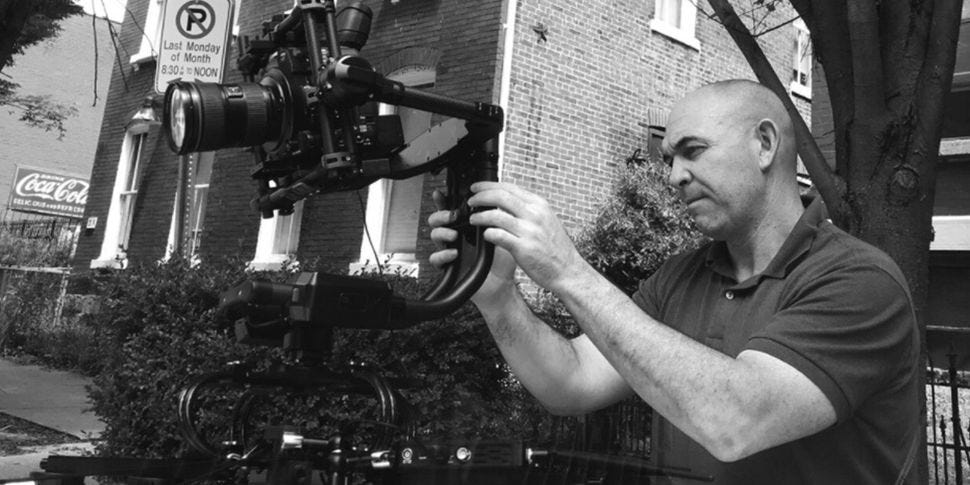Many of you are already familiar with Eli Steele’s brilliant documentary films that explore issues of race, and identity politics in America. They include How Jack Became Black and What Killed Michael Brown. His filmography in full may be found here and makes for a compelling viewing list.
Eli Steele’s great-grandfather on his father’s side was born into American slavery and his grandmother on his mother’s side escaped the Nazis. His father and frequent collaborator is Shelby Steele, the famous Black conservative and author of National Book Critics Circle award winner “The Content of our Character,” a book that got him cancelled back in the 1990s.
Eli has written for publications ranging from LA Times, Quillette to Commentary Magazine. For more on Eli, make sure to read this Batya Ungar-Sargon’s 2020 interview.
Just over a year ago, I (Natalya) was introduced to Eli, who is deaf in addition to being Black and Jewish, by a mutual friend in Los Angeles when she learned that we were producing “15 Days…” our documentary about the impact of school closures and pandemic restrictions on children. When we spoke, Eli graciously agreed to mentor us- film newbies -and has been a friend and supporter at every step of the process.
Last month, he joined the “15 Days…” team as Associate Producer and we are thrilled beyond words! We were also grateful for the opportunity to interview him, both as a father of two school aged children and a deaf person who had to navigate Los Angeles in a sea of masks.
Currently Eli and his father Shelby Steele are producing a documentary based on his father’s 2007 widely lauded essay “White Guilt,” which Newsweek described as: “For those who do not already know, this elegant essay will show why Shelby Steele is America’s clearest thinker about America’s most difficult problem. Braiding family memories with an acute understanding of national policies, he demonstrates what went wrong when whites for their reasons, and blacks for theirs, embraced the idea that white guilt explains blacks’ problems and can be the basis of policies for ameliorating them.”
This is Eli Steele’s first post for Restore Childhood. It was adapted from earlier tweets we felt were important to amplify.
-Natalya and Dana
What we need is not the depolarization of America but the de-victimization of America.
Organizations working to depolarize America often focus on tools of empathy and openness. However, during my time with several organizations, they never seem to ask this crucial question: what are people holding onto that keeps them in this polarized state?
I believe the answer is that they are holding onto some form of power. And in today’s identity politics America, an identity grounded in victimization is power.
We are told that if we are black or the “right” kind of POC, then we are part of the victimized/oppressed group. Most of us cannot resist the power that comes with identity politics victimization and that plays a large role in keeping us polarized. As someone who is black, Jewish, native American, white, and deaf, I’ve been tempted by this power of victimization.
When applying to college, I was offered a $25K MLK scholarship if I checked “black.”
I was a middle class kid and it felt like a false honor of sorts and I said no. Today, the pressure to claim some sort of victimized identity is far worse.
This culture of identity politics victimization grew out of post-60s liberalism. Many conservatives resisted this trend and stressed merit, individualism, etc. However, in recent years, many on the right have fallen into the trap of creating their own version of identity politics victimization. In general, many white conservatives see themselves as whites falsely smeared with America’s legacy of racial oppression.
Like the other side that they despise, these whites created their own grievances — certainly not as powerful as the left’s grievances, but grievances nevertheless.
So, now everybody is a victim. This traps us deeper into identity politics where victimization becomes an essential part of our identity. We wear racial essentialism as a badge of “honor.”
My two grandfathers — one born to slaves and one who survived the Holocaust — were victims of the highest order and yet never saw themselves as such. They, along with peers of their time, sought honor as a way out of their tragic circumstances.
My Jewish grandfather lived by these words: The best revenge against Hitler is a life best lived. Substitute segregation for Hitler and you have my black grandfather’s approach to life. There was no reward for victimization during their times.
We have allowed that culture of honor to gradually weaken since the 1960s. Our only hope may be to strip identity politics victimization of its power by stigmatizing it as a badge of weakness. After all, it is a form of profiteering off the past.
These organizations working on depolarizing Americans have to realize is that progress will not be made until identity politics victimization is stripped of its power. It is a discipline to reach for honor and not victimization.
I believe the only way out of identity politics is to reject the racial politics of our skin color. When that corrupted power weakens, polarization will too.
We will have to look at one another as individual humans, and that is an enormous power in its own right.
A far more rewarding one.











Eli you are absolutely right the cure IS to neutralize the issue of polarization, this also negates the victimization card simultaneously
We cross posted to our substack, this is the sort of thing we look for... it demonstrates much of what we believe.